|
|
|
Sort Order |
|
|
|
Items / Page
|
|
|
|
|
|
|
| Srl | Item |
| 1 |
ID:
159133


|
|
|
|
|
| Summary/Abstract |
Russian destabilization efforts aimed at the Baltic States are most likely to come from the Baltic
Sea; be maritime, nonlethal, and nonnaval; and use political, diplomatic, informational, psychological,
and economic tools, and perhaps paramilitary forces.
|
|
|
|
|
|
|
|
|
|
|
|
|
|
|
|
| 2 |
ID:
095368


|
|
|
| 3 |
ID:
100150
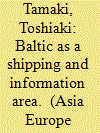

|
|
|
|
|
| Publication |
2010.
|
| Summary/Abstract |
In early modern times, the Netherlands imported grain from the Baltic, especially Poland, and re-exported it elsewhere in Europe. The Dutch shipping industry was extremely profitable, for transport costs were very high, and the number of Dutch ships was by far the largest among the European countries. Dutch prosperity was based on shipping of grain from the Baltic. Amsterdam was also a center of information because it was a port at which many ships stayed, and which attracted various merchants owing to its policy of religious tolerance. Much commercial information and know-how were accumulated in and spread from Amsterdam which contributed to the growth of the regional European economy from the Baltic because many merchants migrated to Northern Europe via the city, bringing with them the latest commercial techniques. Amsterdam therefore served as a core of Baltic integration in the early modern period, for it was a center of shipping and information.
|
|
|
|
|
|
|
|
|
|
|
|
|
|
|
|
| 4 |
ID:
100143
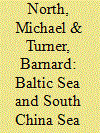

|
|
|
| 5 |
ID:
006483
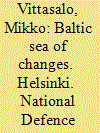

|
|
|
|
|
| Publication |
Helsinki, National Defence College, 1996.
|
| Description |
95p.
|
| Series |
Finnish Defence studies; no.9
|
| Standard Number |
9512508125
|
|
|
|
|
|
|
|
|
|
|
|
Copies: C:1/I:0,R:0,Q:0
Circulation
| Accession# | Call# | Current Location | Status | Policy | Location |
| 038064 | 359/VII 038064 | Main | On Shelf | General | |
|
|
|
|
| 6 |
ID:
054387
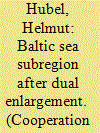

|
|
|
| 7 |
ID:
151463


|
|
|
|
|
| Summary/Abstract |
The story of recovery German codebooks from the wreckage of German light cruiser Magdeburg by Russian Navy and the latter use of these books by Royal Navy are widely known. What the Russians were doing with their copies of codebooks has not been thoroughly covered in English. This article deals with elaborate SIGINT system on the Baltic Sea during WWI and especially the heart of it – Sipthamn SIGINT station. There in the middle of woods in current Estonian territory was situated the first radio station in world with intelligence as its primary function. Decryption efforts were directed by Ernst Vetterlein who left Russia 1918 to become a leading cryptologist on Russian direction in the British GC&CS.
|
|
|
|
|
|
|
|
|
|
|
|
|
|
|
|
| 8 |
ID:
138566


|
|
|
|
|
| Summary/Abstract |
Estonians were in full Christmas mood in late December, buying presents and mingling at holiday markets to the background music of children practicing songs greeting the arrival of Baby Jesus. But at 5:05 p.m. on December 9, 2014, another unexpected guest appeared: a Russian IL-20 reconnaissance plane, which entered Estonian airspace without permission, without a flight plan, and with its transponder switched off.
|
|
|
|
|
|
|
|
|
|
|
|
|
|
|
|
| 9 |
ID:
100147


|
|
|
|
|
| Publication |
2010.
|
| Summary/Abstract |
Comparative interregionalism is often limited to the policy or panoramic dimension, reducing local differences and specificities, the "minute particulars" (Blake, William Blake's Writings, 614, 620, 1978) of the lifeworld to their more abstract forms. This is particularly the case when the European Union (EU) and Association of Southeast Asian Nations (ASEAN) are compared: generalities remain abstractions, whereas the sharper the focus the more diffferentiated the mindscape becomes and the more the basis for the comparison is undermined. Yet, in a global knowledge networked economy (to get all the buzzwords in one phrase), comparisons are necessary if often invidious. While commentators are often reluctant to see the EU as a model for ASEAN, it is often seen as a complex of experiences to be shared. Yet what-in this domain-gets exported, transplanted and implanted elsewhere, how does this transference take place in such an internetted society, and to what end? Seen in an interregional, even global context, and including an examination of teaching Günter Grass' Crabwalk (Im Krebsgang, 2002) in English translation to undergraduates of a contemporary European literature class at the National University of Singapore, the paper hopes to indicate some temporal and spatial contexts of transplantation and the means by which this is achieved.
|
|
|
|
|
|
|
|
|
|
|
|
|
|
|
|
| 10 |
ID:
120691


|
|
|
| 11 |
ID:
165359


|
|
|
|
|
| Summary/Abstract |
This article discusses roles and missions of the United States Navy with a particular focus on the Baltic Sea. That particular sea has gained renewed political and military attention following Russia's resurgent and increasingly hybrid-offensive foreign policy. Baltic nations, uncertain of what the future holds, ought to look at sea power and maritime missions in the Baltic, as well as US naval presence in Europe, to draw lessons for future posture.
|
|
|
|
|
|
|
|
|
|
|
|
|
|
|
|
| 12 |
ID:
187499
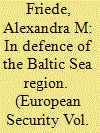

|
|
|
|
|
| Summary/Abstract |
This article analyses changes in national defence policies across the Baltic Sea region after the exogenous shock of the Ukraine crisis in 2014. It draws on Punctuated Equilibrium Theory for theoretical guidance, particularly to understand the mechanisms leading to large-scale policy change after periods of relative stability. Since the outbreak of the Ukraine crisis, defence budgets in the Baltic Sea region have increased dramatically. Baltic Sea states invested in neglected capability development and redirected policy planning towards territorial and collective defence. By contrast, the Russian-Georgian conflict in 2008 had a negligible effect on the paradigm guiding defence planning processes, delayed and lukewarm policy responses let adaptation pressure grow. The empirical findings suggest that policy change reinforced post-2014 because a normative consensus emerged on why Europe's security order is at risk, a critical threshold of urgency was reached, setting off positive feedback cycles, and receptive policy venues, such as NATO, as well as capable external policy actors, such as the USA and the UK, put Baltic Sea security back on the agenda.
|
|
|
|
|
|
|
|
|
|
|
|
|
|
|
|
| 13 |
ID:
132444
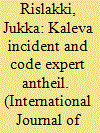

|
|
|
|
|
| Publication |
2014.
|
| Summary/Abstract |
An experienced U.S. code clerk was among the victims when the Soviets shot down a civilian Finnish passenger plane on a regular flight above the Baltic Sea in June 1940. It happened three months after the end of the Winter War between Soviet Union and Finland. Was the 27-year-old code expert Henry W. Antheil, and the diplomatic pouches and codes he was carrying, the reason for this attack?
Very belated, in May 2007, the name of Henry W. Antheil, Jr. was finally inscribed on a marble memorial plaque in the U.S. State Department's C Street lobby. 1 His career was cut tragically short on 14 June 1940, when his plane, the Finnish Aero airliner Junkers Ju 52 Kaleva was destroyed at 2:05 p.m. local time, shortly after taking off from Tallinn's Ülemiste airport en route to Helsinki.
|
|
|
|
|
|
|
|
|
|
|
|
|
|
|
|
| 14 |
ID:
147032
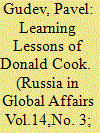

|
|
|
|
|
| Summary/Abstract |
On April 11 and 12, 2016, the U.S. destroyer USS Donald Cook, armed with dozens of nuclear-capable Tomahawk cruise missiles with a range of up to 2,500 kilometers, was approximately 70 kilometers off the town of Baltiysk, Russia's Kaliningrad Region. This circumstance attracted the attention of Russia's Baltic Fleet Command. The fleet's Su-24 warplanes and Ka-27 helicopter made several low passes over the destroyer in extremely close proximity to the ship. The incident provoked discussions on the legitimacy of these actions at a high diplomatic level.
|
|
|
|
|
|
|
|
|
|
|
|
|
|
|
|
| 15 |
ID:
068708
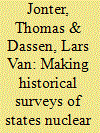

|
|
|
| 16 |
ID:
100149
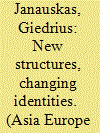

|
|
|
|
|
| Publication |
2010.
|
| Summary/Abstract |
The accession of Estonia, Latvia, Lithuania, Poland to the European Union (EU) has led to an increase in initiatives on Baltic Sea issues and a degree of enhanced confidence in moving towards solutions. While EU policies and instruments, and the provision of significant financial resources, have increased, one might still ask whether people across the Baltic Sea region are ready for the changes implied by the new Baltic strategy and comparable initiatives. Marko Lehti and David Smith have "tried to show that national thinking is by no means self-evident and that the Baltic can be comprehended as a trans-national space". Yet, how this position is articulated in the various societies warrants close investigation. This position is closely related to dominant identities and images within Baltic societies. How will the EU's innovative strategy and the resulting change of images impact upon the conceptual understandings of the Baltic Sea and region, including perhaps the search for a common identity as a successful and a pilot scheme?
|
|
|
|
|
|
|
|
|
|
|
|
|
|
|
|
| 17 |
ID:
179510


|
|
|
|
|
| Summary/Abstract |
Fourth Industrial Revolution technologies and their applicability at sea now dominate debates about the future of naval operations. This article examines the extent to which such technologies, including autonomous and unmanned weapon systems and artificial intelligence, will disrupt naval warfare. Using two case studies, the South China Sea and the Baltic Sea, this article finds that in the key operational output of attaining sea control these technologies will not disrupt naval warfare. While they may intensify the competition between the operational attributes of detection, stealth, range and lethality, they will ultimately sustain existing understandings of seapower and its strategic effects.
|
|
|
|
|
|
|
|
|
|
|
|
|
|
|
|
| 18 |
ID:
154814
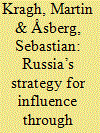

|
|
|
|
|
| Summary/Abstract |
Russia, as many contemporary states, takes public diplomacy seriously. Since the inception of its English language TV network Russia Today in 2005 (now ‘RT’), the Russian government has broadened its operations to include Sputnik news websites in several languages and social media activities. Moscow, however, has also been accused of engaging in covert influence activities – behaviour historically referred to as ‘active measures’ in the Soviet KGB lexicon on political warfare. In this paper, we provide empirical evidence on how Russia since 2014 has moved towards a preference for active measures towards Sweden, a small country in a geopolitically important European region. We analyse the blurring of boundaries between public diplomacy and active measures; document phenomena such as forgeries, disinformation, military threats and agents of influence and define Russian foreign policy strategy. In summary, we conclude that the overarching goal of Russian policy towards Sweden and the wider Baltic Sea is to preserve the geostrategic status quo, which is identified with a security order minimising NATO presence in the region.
|
|
|
|
|
|
|
|
|
|
|
|
|
|
|
|
| 19 |
ID:
117391


|
|
|
|
|
| Publication |
2012.
|
| Summary/Abstract |
ON JULY 1 OF THIS YEAR, Russia officially assumed the presidency of the Council of the Baltic Sea States (CBSS). It so happens that this year the Council is marking its 20th anniversary. This may not be a very long period by historical standards but for an international organization it is quite a mature stage of activity.
Readers will be reminded that the CBSS was established in 1992 on the initiative of then-foreign ministers of Germany and Denmark, H.-D. Genscher and U. Ellemann Jensen. The idea was to overcome the Cold War legacy, remove barriers of bloc-to-bloc confrontation that existed in the region, and promote an atmosphere of trust in relations between the states that had previously been on different sides of the ideological divide. Russia from day one supported the creation of the council, seeing it as a structure capable of effectively restoring the previous community of states with access to the Baltic Sea.
|
|
|
|
|
|
|
|
|
|
|
|
|
|
|
|
| 20 |
ID:
150441
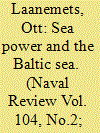

|
|
|
|
|
|
|
|